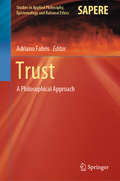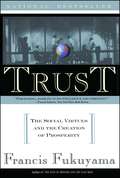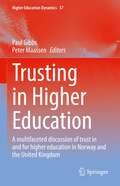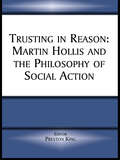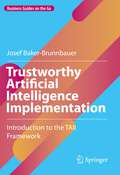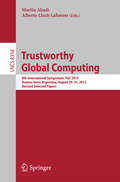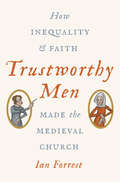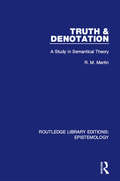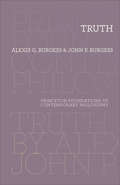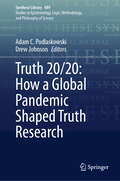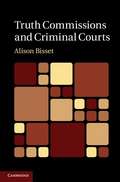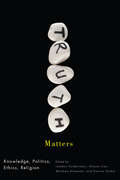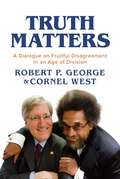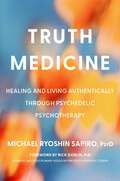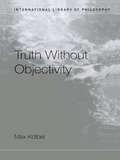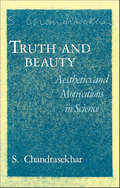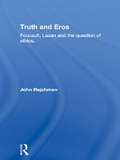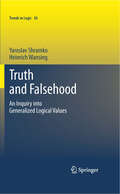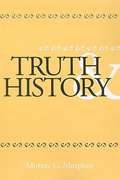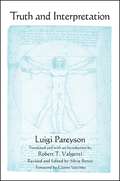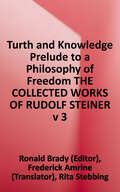- Table View
- List View
Trust: A Philosophical Approach (Studies in Applied Philosophy, Epistemology and Rational Ethics #54)
by Adriano FabrisThis book presents cutting-edge concepts on the question of trust. Written by leading experts, it investigates a paradoxical feature of contemporary society: while information and communication technologies, on the one hand, and scientific discourses, on the other, can promote more informed participation in public and democratic life, they have also led to a dramatic decline in our communicative and cooperative skills. The book analyzes the notion of trust from an interdisciplinary perspective by combining the normative (continental) and empirical (Anglo-American) approaches and by considering the political, epistemological, and historical transformations in the interpersonal relationships sparked by new technologies. Using trust as a model, it then investigates and clarifies the new types of participation that are made possible by scientific and technological advances.
Trust: Human Nature and the Reconstitution of Social Order
by Francis FukuyamaIn his bestselling The End of History and the Last Man, Francis Fukuyama argued that the end of the Cold War would also mean the beginning of a struggle for position in the rapidly emerging order of 21st-century capitalism. In Trust, a penetrating assessment of the emerging global economic order "after History," he explains the social principles of economic life and tells us what we need to know to win the coming struggle for world dominance. Challenging orthodoxies of both the left and right, Fukuyama examines a wide range of national cultures in order to divine the underlying principles that foster social and economic prosperity. Insisting that we cannot divorce economic life from cultural life, he contends that in an era when social capital may be as important as physical capital, only those societies with a high degree of social trust will be able to create the flexible, large-scale business organizations that are needed to compete in the new global economy. A brilliant study of the interconnectedness of economic life with cultural life, Trust is also an essential antidote to the increasing drift of American culture into extreme forms of individualism, which, if unchecked, will have dire consequences for the nation's economic health.
Trusting in Higher Education: A multifaceted discussion of trust in and for higher education in Norway and the United Kingdom (Higher Education Dynamics #57)
by Peter Maassen Paul GibbsThis multidisciplinary book brings together scholars from Norway and the UK to discuss the notion of trust within the structures and forms of higher education located in two distinctive localities. The meaning of trust is multi-variant and nuanced, but is omnipresent in the literature on higher education ranging from student engagement to policy exhortations. A key feature of this book is the effort to integrate the term ‘trust’ conceptually, functionally and phenomenological more generally as well as within the context of higher education. Practice from within Norway and the UK is used to illustrate and expose relevant similarities and varieties in trust and the (possible) lack of it within the sector. The book thus faces the complexity of trust and its distinctive manifestation through a number of analytical lenses and realities.
Trusting in Reason: Martin Hollis and the Philosophy of Social Action
by Preston KingMartin Hollis (d.1998) was arguably the most incisive, eloquent and witty philosopher of the social sciences of his time. His work is appreciated and contested here by some of the most eminent of contemporary social theorists. Hollis's philosophy of social action routinely distinguished between understanding (rational) and explanation (causal). He argued that the aptest account of human interaction was to be made in terms of the first. Thus he focused upon the human reasons, for, rather than upon the natural causes of, action.This volume, for the first time, brings together important essays on the work of Hollis, from many different perspectives. These include politics, sociology and economics in general; international relations, rational choice theory, constitutionalism and the rule of law as well as current concerns with relativism, Rousseauist contractarianism, 'dirty hands' and 'buck-passing'.
Trustworthy Artificial Intelligence Implementation: Introduction to the TAII Framework (Business Guides on the Go)
by Josef Baker-BrunnbauerRapidly developing Artificial Intelligence (AI) systems hold tremendous potential to change various domains and exert considerable influence on societies and organizations alike. More than merely a technical discipline, AI requires interaction between various professions. Based on the results of fundamental literature and empirical research, this book addresses the management’s awareness of the ethical and moral aspects of AI. It seeks to fill a literature gap and offer the management guidance on tackling Trustworthy AI Implementation (TAII) while also considering ethical dependencies within the company. The TAII Framework introduced here pursues a holistic approach to identifying systemic ethical relationships within the company ecosystem and considers corporate values, business models, and common goods aspects like the Sustainable Development Goals and the Universal Declaration of Human Rights. Further, it provides guidance on the implementation of AI ethics in organisations without requiring a deeper background in philosophy and considers the social impacts outside of the software and data engineering setting. Depending on the respective legal context or area of application, the TAII Framework can be adapted and used with a range of regulations and ethical principles. This book can serve as a case study or self-review for c-level managers and students who are interested in this field. It also offers valuable guidelines and perspectives for policymakers looking to pursue an ethical approach to AI.
Trustworthy Global Computing: 8th International Symposium, TGC 2013, Buenos Aires, Argentina, August 30-31, 2013, Revised Selected Papers (Lecture Notes in Computer Science #8358)
by Martín Abadi and Alberto Lluch LafuenteThis book constitutes the thoroughly refereed post-conference proceedings of the 8th International Symposium on Trustworthy Global Computing, TGC 2013, held in Buenos Aires, Argentina, in August 2013. The 15 revised full papers presented together with 3 invited talks were carefully reviewed and selected from 29 submissions. The papers cover a wide range of topics in the area of global computing and safe and reliable computation. They are organized in topical sections on security, π-calculus, information flow, models, specifications and proofs and quantitative analysis.
Trustworthy Men: How Inequality and Faith Made the Medieval Church
by Ian ForrestThe medieval church was founded on and governed by concepts of faith and trust--but not in the way that is popularly assumed. Offering a radical new interpretation of the institutional church and its social consequences in England, Ian Forrest argues that between 1200 and 1500 the ability of bishops to govern depended on the cooperation of local people known as trustworthy men and shows how the combination of inequality and faith helped make the medieval church.Trustworthy men (in Latin, virifidedigni) were jurors, informants, and witnesses who represented their parishes when bishops needed local knowledge or reliable collaborators. Their importance in church courts, at inquests, and during visitations grew enormously between the thirteenth and fifteenth centuries. The church had to trust these men, and this trust rested on the complex and deep-rooted cultures of faith that underpinned promises and obligations, personal reputation and identity, and belief in God. But trust also had a dark side. For the church to discriminate between the trustworthy and untrustworthy was not to identify the most honest Christians but to find people whose status ensured their word would not be contradicted. This meant men rather than women, and—usually—the wealthier tenants and property holders in each parish. Trustworthy Men illustrates the ways in which the English church relied on and deepened inequalities within late medieval society, and how trust and faith were manipulated for political ends.
Truth & Denotation: A Study in Semantical Theory (Routledge Library Editions: Epistemology)
by R. M. MartinOriginally published in 1958. A study in the logical foundations of modern theoretical semantics, this book is concerned with notions of designation and consistency as well as denotation and truth. It presents several semantical theories, each of which with what were new concepts or treatments from the author. Talking at a time when semantical theory was gained great ground, this book also looks at the methodology of the sciences and the semantics of scientific language alongside analysis of meaning and expression. It is influenced by the writings of Carnap, Church, Frege, Goodman, Quine, Russell and Tarski.
Truth (Princeton Foundations of Contemporary Philosophy #9)
by John P. Burgess Alexis G. BurgessThis is a concise introduction to current philosophical debates about truth. Combining philosophical and technical material, the book is organized around, but not limited to, the view known as deflationism. In clear language, Burgess and Burgess cover a wide range of issues, including the nature of truth, the status of truth-value gaps, the relationship between truth and meaning, relativism and pluralism about truth, and semantic paradoxes from Alfred Tarski to Saul Kripke and beyond. The book provides a rich picture of contemporary philosophical theorizing about truth, one that will be essential reading for philosophy students as well as philosophers specializing in other areas.
Truth 20/20: How a Global Pandemic Shaped Truth Research (Synthese Library #489)
by Adam C. Podlaskowski Drew JohnsonThis book offers a collection of papers on focal themes in truth research, including minimalism, pragmatism and pluralism, and philosophical logic. It further provides valuable hindsight with contemporary perspectives on the works of Frege, Wittgenstein, Ramsey, Strawson, and Evans on truth, and it features recent discussions on the role and value of truth in politics and political discourse. The collection is based on groundbreaking presentations hosted by the Virtual International Consortium for Truth Research (VICTR), including talks given at the TRUTH 20/20 conference. The volume features exclusive transcriptions of panel discussions on truth and factuality with Huw Price, Douglas Edwards, Cheryl Misak, and Amie Thomasson, and on truth and polarization with Michael Lynch, Maria Baghramian, and Cailin O’Connor. It includes the transcript of a televised 1973 conversation between Peter Strawson and Gareth Evans. And the volume features new contributions from established and early career researchers in the field. Anyone interested in the nature and value of truth will find this volume to be indispensable.
Truth Commissions and Criminal Courts
by Alison BissetThis detailed evaluation of the relationship between trials and truth commissions challenges their assumed compatibility through an analysis of their operational features at national, inter-state and international levels. Alison Bisset conducts case-study analyses of national practice in South Africa, East Timor and Sierra Leone, evaluates the problems posed by the International Criminal Court and considers the challenges presented by the possibility of bystander state prosecutions. At each level, she highlights potential operational conflicts and formulates targeted proposals to enable effective coexistence.
Truth Matters
by Lambert Zuidervaart Allyson Carr Ronnie Shuker Matthew KlaassenWhy should we seek and tell the truth? Does anyone know what truth is? Many are skeptical about the relevance of truth. Truth Matters endeavours to show why truth is important in a world where the very idea of truth is contested. Putting philosophers in conversation with educators, literary scholars, physicists, political theorists, and theologians, Truth Matters ranges across both analytic and continental philosophy and draws on the ideas of thinkers such as Aquinas, Balthasar, Brandom, Davidson, Dooyeweerd, Gadamer, Habermas, Kierkegaard, Plantinga, Ricoeur, and Wolterstorff. Some essays attempt to provide a systematic account of truth, while others wrestle with the question of how truth is told and what it means to live truthfully. Contributors address debates between realists and anti-realists, explore issues surrounding relativism and constructivism in education and the social sciences, examine the politics of truth telling and the ethics of authenticity, and consider various religious perspectives on truth. Most scholars agree that truth is propositional, being expressed in statements that are subject to proof or disproof. This book goes a step farther: yes, propositional truth is important, but truth is more than propositional. To recognize how it is more than propositional is crucial for understanding why truth truly matters. Contributors include Doug Blomberg (ICS), Allyson Carr (ICS), Jeffrey Dudiak (King's University College), Olaf Ellefson (York University), Gerrit Glas (VU University Amsterdam), Gill K. Goulding (Regis College), Jay Gupta (Mills College), Clarence Joldersma (Calvin College), Matthew J. Klaassen (ICS), John Jung Park (Duke University), Pamela J. Reeve (St. Augustine's Seminary), Amy Richards (World Affairs Council of Western Michigan), Ronnie Shuker (ICS), Adam Smith (Brandeis University), John Van Rys (Redeemer University College), Darren Walhof (Grand Valley State University), Matthew Walhout (Calvin College), and Lambert Zuidervaart (ICS).
Truth Matters: A Dialogue on Fruitful Disagreement in an Age of Division
by Cornel West Robert P. GeorgeTwo leading public intellectuals and dear friends—one progressive, one conservative—explore What is Truth? and Why Does Truth Matter?In Truth Matters, Cornel West and Robert P. George address a range of social issues on which Americans today are bitterly divided. Their book models robust intellectual engagement and civil discourse as they explore vital questions surrounding the idea of truth and its foundational role in our lives. Along the way, they reflect on social conditions—such as respect for freedom of speech—that must be established and maintained if truth is to be seriously pursued. They also explore the virtues—such as intellectual humility and courage—that must be acquired and practiced if we frail, fallible, fallen human beings are to be determined truth seekers and bold truth speakers.
Truth Matters: Knowledge, Politics, Ethics, Religion
by Lambert Zuidervaart Allyson Carr Ronnie Shuker Matthew J. KlaassenWhy should we seek and tell the truth? Does anyone know what truth is? Many are skeptical about the relevance of truth. Truth Matters endeavours to show why truth is important in a world where the very idea of truth is contested. Putting philosophers in conversation with educators, literary scholars, physicists, political theorists, and theologians, Truth Matters ranges across both analytic and continental philosophy and draws on the ideas of thinkers such as Aquinas, Balthasar, Brandom, Davidson, Dooyeweerd, Gadamer, Habermas, Kierkegaard, Plantinga, Ricoeur, and Wolterstorff. Some essays attempt to provide a systematic account of truth, while others wrestle with the question of how truth is told and what it means to live truthfully. Contributors address debates between realists and anti-realists, explore issues surrounding relativism and constructivism in education and the social sciences, examine the politics of truth telling and the ethics of authenticity, and consider various religious perspectives on truth. Most scholars agree that truth is propositional, being expressed in statements that are subject to proof or disproof. This book goes a step farther: yes, propositional truth is important, but truth is more than propositional. To recognize how it is more than propositional is crucial for understanding why truth truly matters. Contributors include Doug Blomberg (ICS), Allyson Carr (ICS), Jeffrey Dudiak (King’s University College), Olaf Ellefson (York University), Gerrit Glas (VU University Amsterdam), Gill K. Goulding (Regis College), Jay Gupta (Mills College), Clarence Joldersma (Calvin College), Matthew J. Klaassen (ICS), John Jung Park (Duke University), Pamela J. Reeve (St. Augustine’s Seminary), Amy Richards (World Affairs Council of Western Michigan), Calvin Seerveld (ICS), Ronnie Shuker (ICS), Adam Smith (Brandeis University), John Van Rys (Redeemer University College), Darren Walhof (Grand Valley State University), Matthew Walhout (Calvin College), and Lambert Zuidervaart (ICS).
Truth Medicine: Healing and Living Authentically Through Psychedelic Psychotherapy
by Michael Ryoshin SapiroAn accessible guide to psychedelic psychotherapy and its transformative healing abilities, by a clinical psychologist and psychedelics expert.Are you living the life you&’re meant to be living, or fulfilling somebody else&’s ideas of who you should be? Would you like to learn what&’s true for you underneath the programming while healing old wounds that keep you living in cycles of trauma, depression, and anxiety? Truth Medicine explains why we often feel stuck and are unable to move forward into a life of thriving, and how psychedelic psychotherapy addresses these essential questions for our well-being. Grounded in research and experience, Truth Medicine answers frequently asked questions about psychedelic psychotherapy—what it is and how it works, and what medicines are used (primarily ketamine, with an overview of other medicines on the horizon, such as MDMA and psilocybin), contraindications, and more. Walking readers through the whole process from preparation through medicine sessions and into integration, Dr. Sapiro also shares case studies that are inspiring, engaging, and raw, for a go-to guide for anyone looking to heal. While Truth Medicine describes in detail how psychedelic psychotherapy works to bring about healing and growth, it ultimately points you back inside yourself, where your own wisdom and truth are waiting to be discovered and lived.
Truth Speaks to Power
by Walter BrueggemannWorld-renowned biblical interpreter Walter Brueggemann invites readers to take a closer look at the subversive messages found within the Old Testament. Brueggemann asserts that the Bible presents a "sustained contestation" over truth, in which established institutions of power do not always prevail. But this is not always obvious at first glance. A closer look reveals that the text actually contradicts the apparent meaning of an innocent, face-value reading. Brueggemann invites the reader into this thick complexity of the textual reading, where the authority of power is undermined in cunning and compelling ways. He insists that we are--as readers and interpreters--always contestants for truth, whether we recognize ourselves as such or not.
Truth Without Objectivity (International Library of Philosophy)
by Max KölbelTruth without Objectivity provides a critique of the mainstream view of 'meaning'. Kölbel examines the standard solutions to the conflict implicit in this view, demonstrating their inadequacy and developing instead his own relativist theory of truth.The mainstream view of meaning assumes that understanding a sentence's meaning implies knowledge of the conditions required for it to be true. This view is challenged by taste judgements, which have meaning, but seem to be neither true nor false.
Truth and Beauty: Aesthetics and Motivations in Science
by S. Chandrasekhar"What a splendid book! Reading it is a joy, and for me, at least, continuing reading it became compulsive. . . . Chandrasekhar is a distinguished astrophysicist and every one of the lectures bears the hallmark of all his work: precision, thoroughness, lucidity. "—Sir Hermann Bondi, Nature The late S. Chandrasekhar was best known for his discovery of the upper limit to the mass of a white dwarf star, for which he received the Nobel Prize in Physics in 1983. He was the author of many books, including The Mathematical Theory of Black Holes and, most recently, Newton's Principia for the Common Reader.
Truth and Beauty: Aesthetics and Motivations in Science
by S. ChandrasekharSeven lectures detailing the author&’s thoughts on motivations in the pursuit of science and patterns of scientific creativity.&“What a splendid book! Reading it is a joy, and for me, at least, continuing reading it became compulsive…. Chandrasekhar is a distinguished astrophysicist and every one of the lectures bears the hallmark of all his work: precision, thoroughness, lucidity.&” —Sir Hermann Bondi, Nature Does aesthetics play a role in science? Can it be that science is given impetus by a search for beauty? What relation exists between the beauty of an idea and its power to account for some aspect of the natural world? Throughout his distinguished career, S. Chandrasekhar has given time and thought to these questions and to their implications for his work and the work of others. Truth and Beauty gathers the fruits of his meditations. Heisenberg, observes Chandrasekhar, spoke eloquently of the sheer force of his aesthetic experience when he discovered the key to the quantum theory. Weyl characterized the process of working out his gauge theory as a choice of the beautiful over the true, a choice strongly supported by subsequent research. Einstein also felt the aesthetic power underlying his discoveries. While most of the seven essays in Truth and Beauty deal generally with the nature of science and the process of research, two essays explore the work of individuals. —Edward Arthur Milne and Arthur Stanley Eddington The late S. Chandrasekhar was best known for his discovery of the upper limit to the mass of a white dwarf star, for which he received the Nobel Prize in Physics in 1983. He was the author of many books, including The Mathematical Theory of Black Holes and, most recently, Newton's Principia for the Common Reader.
Truth and Eros: Foucault, Lacan and the question of ethics. (Routledge Library Editions: Michel Foucault)
by John RajchmanIn this reissused work, first published in 1991, John Rajchman isolates the question of ethics in the work of Foucault and Lacan and explores its ramifications and implications for the present day. He demonstrates that the question of ethics was at once the most difficult and the most intimate question for these two authors, offering a complex point of intersection between them. As such, he argues that it belongs to the great tradition that is concerned with the passion or eros of philosophy and of its "will to truth". Truth and Eros suggests a way of reading Foucault and Lacan as philosophers who re-eroticised the activity of thought in our time, opeing new and different spaces for thought and action - new types of subjectivity.
Truth and Falsehood
by Heinrich Wansing Yaroslav ShramkoThe book presents a thoroughly elaborated logical theory of generalized truth-values understood as subsets of some established set of (basic) truth values. After elucidating the importance of the very notion of a truth value in logic and philosophy, we examine some possible ways of generalizing this notion. The useful four-valued logic of first-degree entailment by Nuel Belnap and the notion of a bilattice (a lattice of truth values with two ordering relations) constitute the basis for further generalizations. By doing so we elaborate the idea of a multilattice, and most notably, a trilattice of truth values - a specific algebraic structure with information ordering and two distinct logical orderings, one for truth and another for falsity. Each logical order not only induces its own logical vocabulary, but determines also its own entailment relation. We consider both semantic and syntactic ways of formalizing these relations and construct various logical calculi.
Truth and History
by Murray G. MurpheyHe examines the evidence on which historical theories are based, the types of explanations used, and particularly the way historical theories are tested. The book treats not only the actual process of historical research but also the philosophical problems involved in historical work. The treatment of causation is new, as is the discussion of epistemology. In his discussions, Murphey covers a wide range of sources and examples, including Frederick Jackson Turner, the Gospels, perspectives on the causes of the Great Depression, the Vinland Map, witchcraft, and material culture. The book is addressed to all who do history or write about it, and it will be a useful text for those who teach courses in historiography.
Truth and Interpretation (SUNY series in Contemporary Italian Philosophy)
by Luigi PareysonLuigi Pareyson (1918–1991) was one of the most important Italian philosophers to emerge after World War II and stands shoulder to shoulder with fellow hermeneutic thinkers Hans-Georg Gadamer and Paul Ricoeur. The product of a well-developed theory of interpretation that stretches back to the late 1940s, his 1971 masterpiece Truth and Interpretation provides the historical impetus and theoretical framework for the questions of existence, art, and politics that would motivate his most famous students, Umberto Eco and Gianni Vattimo. In a time when the meaning of truth as an interpretation is challenged by the chaotic din of media on the one side and the violent force of absolute claims from science, religion, and political economy on the other, Pareyson's meditation on the value of thinking that is shaped by the traditions of philosophy and yet responds to contemporary demands remains timely and pressing more than forty years after its initial publication.
Truth and Knowledge: Prelude to a Philosophy of Freedom
by Rudolf SteinerThis third volume of Rudolf Steiner's Collected Works was originally his doctoral dissertation. Terse and to the point, it truly is a prelude to his later Philosophy of Freedom - indeed, one can sense an excitement of discovery that is absent in the latter work. This translation has been thoroughly reworked to make it conform to the late Ronald Brady's masterful introduction, which provides a line-by-line commentary.
Truth and Method
by Hans Georg GadamerA study and investigation that deals with the problem of hermeneutics--- the understanding and interpretation of the Bible and other literary texts arguing that the phenomenon is not a human science or method but the human experience of the world.
